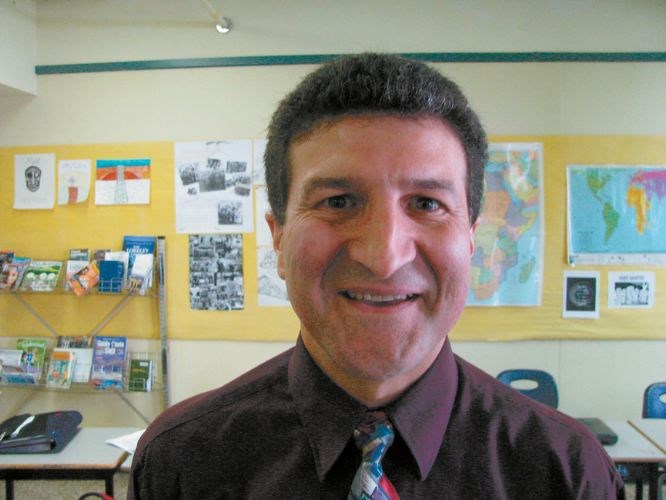A local teacher has been asked to a provincial symposium to teach about the most serious of global issues.
Duchess Park secondary school teacher Gerry Chidiac has won awards and acclaim for his custom-designed high school course entitled Cultures In Conflict. It explores the history of genocide. This April he will be a featured guest at the Holocaust and Genocide Symposium held at Shawnigan Lake School near Victoria.
"I'm going to teach other teachers to teach my course," he said. The delegates will also include some youth leaders from Grade 11 and 12 across the province. It is a chance to put a provincial spotlight on the course, he said.
"That's my dream, to have it taught throughout the province," he said. "I don't know how you get it to that level, but it has been expanding quickly, lately. This year it will be taught at DP Todd for the first time, and it will also be offered for the first time through the School District 57 distance education system, so any student could have access to it."
The course is an examination of those major incidents in history, especially since the Second World War, when one group of people attempted to destroy an entire group of people, for a variety of reaons.
Despite the fact this has happened a number of times in that relatively small period of time all over the world, Chidiac feels growing optimism about the state of world thinking.
"Society always moves forward. Yes there are rotten people, and rotten or unenlightened choices, fear-based choices, and many examples where society failed, but you can also point to a larger sense of progress and shining through the horrors that genocides do demonstrate," he said.
The reason the course is so fundamentally important to teach, he said, is the fragile nature of Canadian features like tolerance of differences and multiethnic acceptance. During the Second World War, he stressed, many Jews who were rescued from the Germans were put into concentration camps here for the duration. Many nations, Canada included, took no additional steps to protect the Jews of Europe. Other incidents like Rwanda, the Baltic states, Darfur, Sierra Leone and so on all happened in modern times, with the developed world watching but not intervening. Some critics are suggesting the conflict in Syria is a cousin of the same apathy.
All of these examples are indications, said Chidiac, of how frequently close humans are to committing the most catastrophic atrocities to other human beings.
"When I teach this to Prince George students I get from them the sense that they understand these issues and understand that they have a real role to play in preventing more of this from occurring," he said. "If we can spread that to more schools and more districts, we provide the best answer to that kind of problem: education. It is also vital to honour those who died in genocides around the world - that their death meant something. With each student educated about genocide, we are one step closer to Never Again."



.png;w=120;h=80;mode=crop)